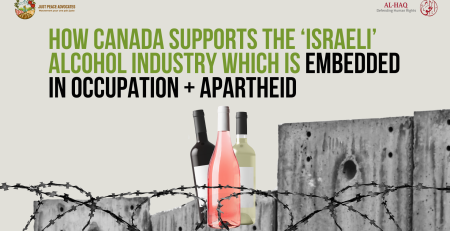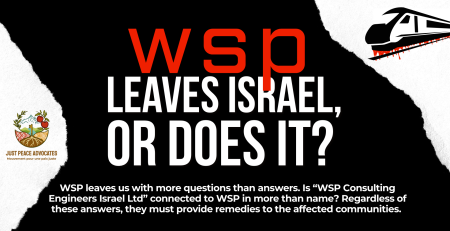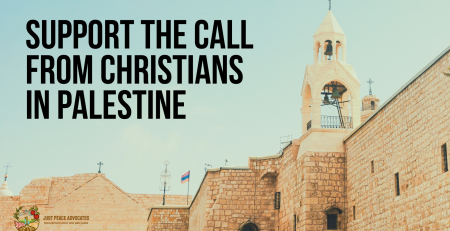Written statements from states and international organization to the International Court of Justice (ICJ) regarding a forthcoming advisory opinion on Palestine have been released.
Once again Canada has shown it pro-Israel blatant disregard for international law.
Not surprising perhaps, Canada issued a brief statement asking the ICJ to not take jurisdiction because Canada is of the opinion it would derail direct negotiations.
Read the written statement submitted by Canada
In a statement dated August 7, 2023, the ICJ indicated:
In the advisory proceedings on the Legal Consequences arising from the Policies and Practices of Israel in the Occupied Palestinian Territory, including East Jerusalem, 57 written statements have been filed in the Registry of the International Court of Justice.
While other countries such as Ireland submitted detailed responses to the December 30, 2022 United National General Assembly resolution requesting the ICJ to provide an advisory opinion regarding the legal consequences of the prolonged occupation and settlement on the Palestinian people’s right to self-determination, Canada provided a brief six-page submission that said since Israel had not agreed to the process the ICJ should not provide a response. Ireland beat Canada for a seat at the UNSC in 2020, with member states recognizing Canada’s pro-Israel bias in its voting record at the United Nations.
Even the US while showing its pro-Israel bias at least took the response to the ICJ somewhat serious with a 100+ page response. It is also worth noting that even long-term close allies of Israel, Germany and the Netherlands, did not provide a response seemingly separating themselves from the current far right Israeli Coalition government.
Canada said in its hastily prepared statement were they actually referenced the United Nations as the “Untied” Nations, that it supports a two-state solution “as the only viable path” with a “longstanding view that only through direct negotiations between the parties that a lasting peace can be achieved.” Canada said they encourage Israel and Palestinians to return to the negotiating table, as “direct dialogue between the parties themselves is the best path to create conditions for Peace.”
Canada being careful to not even accept Palestine as a state, even as it says it supports the “two-state” solution, will not say the word Palestine, only referencing the “Palestinian people.”
Canada concluded its statement to the ICJ that it is “concerned that the issuance of an advisory opinion on Israeli practices in the occupied territories may contribute to a polarization of positions that risks moving the parties further away from a just and lasting resolution to the conflict.”
Canada’s stance would be like suggesting a partner of an abuser needs the abuser to agree to a court process, and then suggesting that the victim join in negotiations with their abuser.
Although NGOs submission are not considered part of the ICJ case file, they are “treated as publications readily available and may accordingly be referred to by States and intergovernmental organizations presenting written and oral statements in the case in the same manner as publications in the public domain.” Canada and all member states are encouraged to consult statement and publications from NGOS, and consider the arguments included while engaging in the proceedings. It is not clear that Canada would be engaging in the proceedings.
It is an embarrassment that Canada has ignored at least five essential substantive legal issues included in the United Nations request to the ICJ for an advisory opinion including: i) right to self-determination; ii) the inherent illegality of the occupation; iii) the prolonged occupation including unlawful use of force; iv) acquisition of territory by force specifically annexation and settlements; and v) discriminatory legislation and measures specifically apartheid.
But not surprising, as despite Canada optical illusion of distancing itself from the current Israeli right-wing Coalition, Canada remains commitment to be an asset for Israel. In November 2018, during an official visit to Israel, Canada’s then Foreign Minister Chrystia Freeland openly said that she hopes securing a seat at the UNSC would allow Canada to serve as an “asset for Israel”. Canada may not have gotten that UNSC seat for that very reason, but still in matters of the UN, ICJ and ICC, Canada positions itself as an “asset for Israel.”
This is not the first time that the ICJ has issued an advisory opinion in regard to Palestine. On July 9 2004, the ICJ confirmed that the Wall is illegal and ruled that Israel must dismantle it. Canada claims to oppose Israel’s construction of the barrier and indicates the construction is contrary to international law under the Fourth Geneva Convention. That said, Canada has taken no concrete action in the almost twenty years since that ICJ ruling to hold Israel accountable.
Read Al-Haq’s statment
Background/specifics from the Canadian submission
Canada also continues to maintain that the Palestine does not have jurisdiction at the International Criminal Court (ICC) based on Canada’s stance that Canada does not accept that Palestine is a state. In 2020 the Canadian government did not submit a brief to the ICC, but the Canadian government did take the position in a letter sent to the ICC in February 2020 that the ICC did not have jurisdiction over Palestine and at the same time, in a veiled threat, reminded the ICC of Canada’s financial contribution.
On December 30, 2022, the United Nations General Assembly (UNGA) resolution A/RES/77/247 indicated that in accordance with Article 96 of the Charter of the United Nations, to request the International Court of Justice, pursuant to Article 65 of the Statute of the Court, to render an advisory opinion on the following questions, considering the rules and principles of international law, including the Charter of the United Nations, international humanitarian law, international human rights law, relevant resolutions of the Security Council, the General Assembly and the Human Rights Council, and the advisory opinion of the Court of 9 July 2004:
(a) What are the legal consequences arising from the ongoing violation by Israel of the right of the Palestinian people to self-determination, from its prolonged occupation, settlement and annexation of the Palestinian territory occupied since 1967, including measures aimed at altering the demographic composition, character and status of the Holy City of Jerusalem, and from its adoption of related discriminatory legislation and measures?
(b) How do the policies and practices of Israel referred to in paragraph 18 (a) above affect the legal status of the occupation, and what are the legal consequences that arise for all States and the United Nations from this status?
Canada did not vote in favour of this resolution requesting an advisory opinion from the International Court of Justice, but Canada says it does accept that the United Nations General Assembly’s can request an advisory opinion but that the “Court should exercise its discretion not to respond to the request..in the present instance in light of compelling reason present in this case.”
Canada as a member state responded to the opportunity to provide relevant information in a July 14th six-page written statement that indicated that:
-Canada “supports efforts to encourage Israel and Palestinians to return to the negotiating table”
-while the Court has jurisdiction this does not mean it is obliged to exercise that jurisdiction. Canada suggests a two-fold reasons that it considers compelling including.
-the “lack of consent to the jurisdiction of the Court by an interested stated to the dispute underlying the request for an advisory opinion”; with Canada “understanding that Israel which has a direct interest in this case, has not provided consent for the ICJ to be seized by the matter” and
-that “the UN Security Council is the body with primary responsibility for the over arching issues, not the UN General Assembly.”
-and that Canada feels “direct dialogue between the parties themselves is the best path to create conditions for Peace.”
Canada concludes that it is “concerned that the issuance of an advisory opinion on Israeli practices in the occupied territories may contribute to a polarization of positions that risks moving the parties further away from a just and lasting resolution to the conflict.” Suggesting that “while not legally binding an advisory opinion could impact the outcome of the negotiation framework established by the UN Security Council.” Thus, Canada maintains that since this involves the “resolution of a bilateral dispute where an interested state has not accepted the jurisdiction of the Court, and given that the UN Security Council has established a framework for the parties to resolve the dispute through negotiations” that in Canada’s view “there are compelling reasons for the Court to exercise its discretion to decline the request of the UN General Assembly for an advisory opinion with regard to the questions posed in resolution A/RES/77/247 dated December 30, 2022.”
The response was signed by Alan H. Kessel, Assistant Deputy Minister and Legal Advisor, Global Affairs, as agent for the government of Canada.
To contrast read the written statement submitted to the ICJ from Ireland:
Letter writing action sponsored by:
Just Peace Advocates
The Canadian Foreign Policy Institute (CFPI)
photo credit: peacequest.ca






